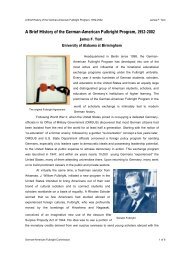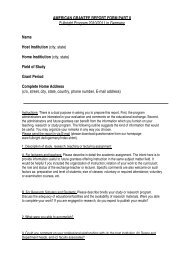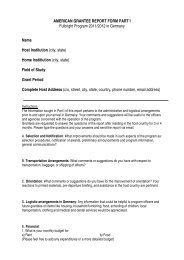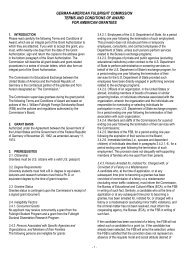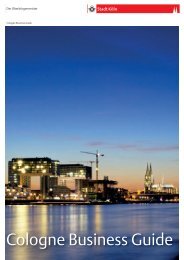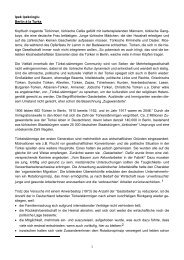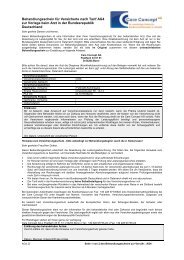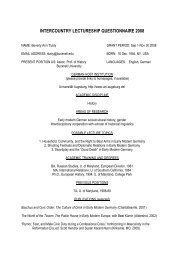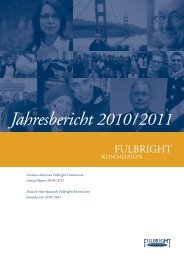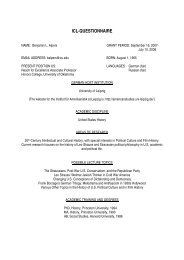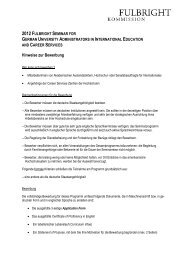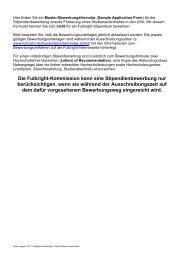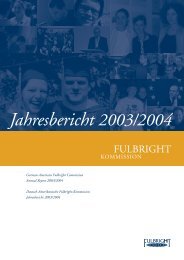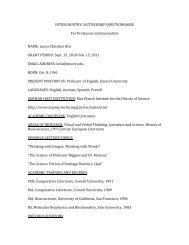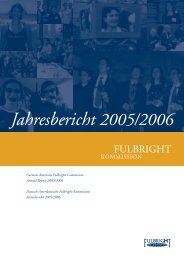Funnel 40/2, Inhalt - Fulbright-Kommission
Funnel 40/2, Inhalt - Fulbright-Kommission
Funnel 40/2, Inhalt - Fulbright-Kommission
Create successful ePaper yourself
Turn your PDF publications into a flip-book with our unique Google optimized e-Paper software.
26<br />
ALUMNI PROFILES<br />
Lucian Kim<br />
The <strong>Fulbright</strong> Program,<br />
springboard to a dream career<br />
When I first heard about it, I thought<br />
the <strong>Fulbright</strong> grant for young journalists<br />
had been designed just for me. Although<br />
I was only halfway into my second semester<br />
of a two-year master’s program in journalism,<br />
I was itching to return to the<br />
world beyond the arcane province of<br />
Berkeley, California. I had already squandered<br />
several years after college on<br />
bohemian pursuits in east central Europe.<br />
Now I was ready to turn my wanderlust<br />
into a profession.<br />
It was spring 1996—the Bosnian war<br />
had just ended but Slobodan Milosevic was<br />
still firmly in power. The eastward expansion<br />
of NATO and the EU was not yet a<br />
foregone conclusion. The project of German<br />
reunification was sputtering along.<br />
And then a classmate told me that the<br />
<strong>Fulbright</strong> Commission was seeking applicants<br />
for a brand new scholarship that<br />
would take five young American journalists<br />
to Germany for a year. Fulfilling the<br />
basic qualifications—but not yet feeling<br />
like a bona fide journalist—I sent in my<br />
application and crossed my fingers.<br />
Half a year later I was attending the <strong>Fulbright</strong><br />
orientation at the Atlantic Hotel in<br />
Bremen. It happened to be my birthday,<br />
and I was sure that I had not received this<br />
kind of present before: a monthly allowance<br />
I could only have dreamed of as a student;<br />
complete license to travel where I wanted;<br />
and no pressure whatsoever to publish.<br />
A couple of days later I took the train<br />
to Berlin and soon was ensconced in a oneroom<br />
apartment overlooking a dim courtyard<br />
in the heart of Kreuzberg. The shower<br />
was in the kitchen, the toilet was in a<br />
THE FUNNEL • VOLUME <strong>40</strong> • NUMBER 2 • SUMMER 2004<br />
Kim interviewing Ahmed Shah Massoud, the late leader of the Northern Alliance, in northern<br />
Afghanistan in summer 2000. Massoud was assassinated 2 days before September 11, 2001, in what<br />
many people say was a connected hit.<br />
closet, and the heating came from a huge<br />
tiled oven fired by coal briquettes I kept<br />
stacked in one corner. With my first<br />
stipend I bought a fax machine and subscribed<br />
to an internet service provider.<br />
What more did an aspiring reporter need?<br />
A bar and someone to drink with. By<br />
another stroke of luck, a fellow young journalist,<br />
Melissa Eddy, lived just down the<br />
street above an all-night watering hole<br />
called the Haifischbar. Melissa would<br />
become one of several dear friends I made<br />
during my <strong>Fulbright</strong> year.<br />
Getting started in the rough-and-tumble<br />
world of freelance journalism is a risky<br />
undertaking. But thanks to my grant I had<br />
the freedom to fail. During the boisterous<br />
student demonstrations against Milosevic<br />
that winter, I flew down to Belgrade. I<br />
reported, I wrote, I filed—but I didn’t get<br />
a single story published. It didn’t matter. I<br />
learned a great deal and made several<br />
friends among Belgrade’s student activists.<br />
The experience would serve me well in later<br />
reporting trips to the Balkans.<br />
The only requirement of my <strong>Fulbright</strong><br />
grant was to complete an internship at a<br />
German media outlet. So during the second<br />
half of the year I moved to Hamburg<br />
for a couple of months to intern at Die Zeit.<br />
The paper was my choice, but it was the<br />
<strong>Fulbright</strong> Commission that had landed me<br />
a spot on the business desk. Surprisingly I<br />
managed to get a couple of articles into the<br />
paper—one story was on how the German<br />
vending machine industry was dreading<br />
the switch from deutsche marks to euros.<br />
I found Hamburg’s legendary coolness<br />
too chilly, however, and was happy to<br />
return to the relative chaos of Berlin. The<br />
city was beginning to feel like home. The<br />
<strong>Fulbright</strong> Commission extended my grant<br />
by several months, just as my stories were<br />
starting to get into print with increasing<br />
regularity.<br />
By the time my grant expired, I was supporting<br />
myself in my dream job of foreign<br />
correspondent. I would end up keeping<br />
Berlin as my base for the following five<br />
years, covering events in Germany and<br />
Central Europe, the Balkans, the Baltics,<br />
Central Asia, Afghanistan, and North<br />
Korea. I contributed to a number of papers,<br />
including US News & World Report, the<br />
Boston Globe and the Christian Science<br />
Monitor.<br />
Today I work as an editor at the Moscow<br />
Times, Russia’s English-language daily.<br />
There has been nothing logical or predictable<br />
about my career path so far. But I<br />
am convinced that my <strong>Fulbright</strong> grant was<br />
the starting point that made it possible.



